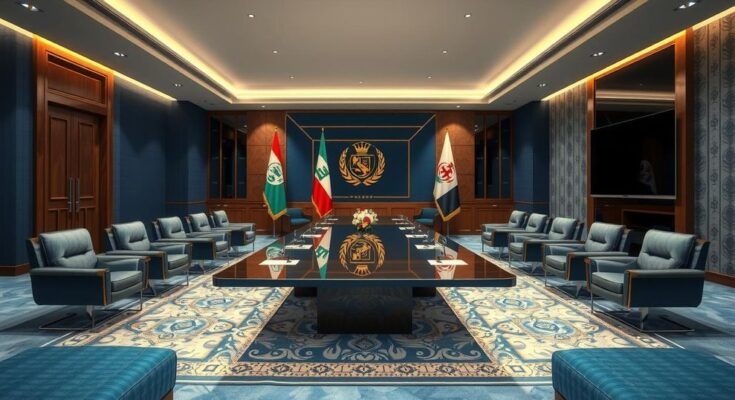The UAE is solidifying its role as a key U.S. ally in the Middle East, particularly in countering Iran through collaborative initiatives and AI advancements. Recent meetings between President Trump and UAE National Security Adviser Sheikh Tahnoon highlight this growing partnership, focusing on security, economic cooperation, and technological innovation. The UAE navigates its global ambitions amidst regional complexities, including the U.S.-Iran nuclear discourse and rising tensions involving Israel and Hamas.
The United Arab Emirates (UAE) is emerging as a formidable ally for U.S. interests in the Middle East, particularly as President Donald Trump aims to counter Iran’s influence. During a recent meeting in Washington, Trump underscored the partnership with UAE National Security Adviser Sheikh Tahnoon, emphasizing their collaborative commitment to enhancing peace and security within the region.
Sheikh Tahnoon engaged with numerous U.S. officials and business leaders, advocating for a substantial $30 billion artificial intelligence (AI) infrastructure fund. This initiative highlights the UAE’s ambition to establish itself as a leading figure in global AI advancements, especially amidst ongoing competition with China.
The Trump administration recognizes Gulf allies, notably the UAE and Saudi Arabia, as pivotal partners in the Middle East strategy. The Abraham Accords, which have normalized relations between Israel and various Gulf states, fortify these alliances and provide a unified front against Iranian influence. Collaborative military efforts against Iran-supported groups like the Houthis in Yemen further illustrate this strategic partnership.
Trump recently hosted Sheikh Tahnoon at the White House, reinforcing this alliance with a formal dinner attended by senior U.S. officials. Discussions included urgent topics such as curtailing Iran’s nuclear missile efforts and addressing terrorism, which threaten regional stability. Additionally, the UAE’s efforts to optimize relations with the U.S. come amidst previous tensions during the Biden administration over AI technology restrictions.
In a pivotal moment, MGX, along with notable partners including BlackRock and Microsoft, announced the formation of the AI Infrastructure Partnership (AIP), aiming to raise $30 billion to bolster AI infrastructure. Sheikh Tahnoon’s visit to Washington sought to push the innovation agenda forward, engaging with key figures like Elon Musk and Oracle’s Larry Ellison.
Experts note that the respect accorded to Sheikh Tahnoon by Trump signifies the U.S.’s deep appreciation for the UAE’s diplomatic role, particularly in mediating ongoing tensions with Iran. Political analyst Abdulkhaleq Abdulla stated that this reception reflects Washington’s trust in the UAE as a stabilizing force in regional dynamics.
The UAE’s role is pivotal as tensions rise between the U.S. and Iran regarding nuclear negotiations, alongside ongoing conflicts involving Israel and Hamas in Gaza. The strategic partnership between the UAE and the U.S. is expected to be crucial in navigating these complexities moving forward.
In summary, the UAE’s increasing significance as a U.S. ally in the Middle East is underscored by current diplomatic engagements and shared strategic goals. As the UAE positions itself at the forefront of AI development and regional stability, it has successfully cultivated a partnership with the U.S. aimed at countering Iranian influence and enhancing security across the Middle East. The implications of these diplomatic ties are substantial as they unfold amidst rising geopolitical tensions.
Original Source: www.newsweek.com




